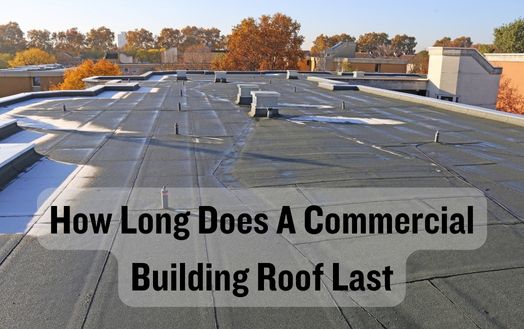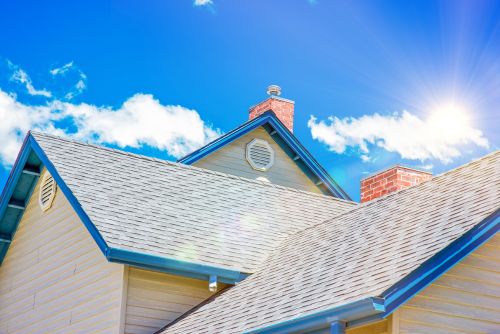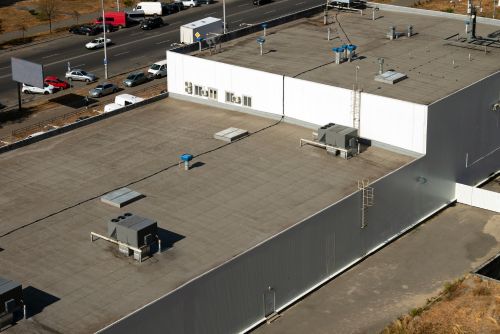
Have you ever wondered how long does a commercial building roof last? As a professional in the construction industry, I’ve often pondered this question myself. It’s a common assumption that commercial roofs are built to withstand the test of time, but is this theory really true?
Well, there’s no simple answer. The lifespan of a commercial building roof depends on various factors, and in this discussion, we will delve into those factors to uncover the truth.
So, let’s explore the average lifespan of commercial building roofs and what can potentially affect their longevity.
Commercial roofs typically last 20–30 years. The quality of roofing materials and maintenance can affect their longevity. These factors affect the lifespan of commercial building roofs, so innovative audiences should consider them.
The roofing materials used on commercial buildings affect their lifespan. Advanced membranes and solar reflective coatings can extend roof life. These materials are UV-resistant, weatherproof, and durable. Businesses can prolong roof life and reduce repairs by using modern roofing materials.
Commercial building roofs need regular maintenance to last longer. Innovative maintenance methods like drones and thermal imaging can spot issues before they become major ones. Businesses can avoid costly repairs and extend roof life by being proactive and addressing small issues.
Proper installation, climate, and building design also affect commercial roof lifespan. A secure and durable roof system can be achieved with adhesive technologies and fasteners. Consider the local climate and design roofs to withstand high winds and heavy snow to extend their lifespan.

Commercial roofs last longer with proper maintenance and quality materials. Certain factors can significantly extend a commercial roof’s lifespan, including:
Commercial roofs need regular inspections to last. As an innovative audience looking to extend the life of their commercial building’s roof, regular roof inspections are crucial. This essential maintenance task can cause costly repairs, structural damage, and premature roof replacement if ignored.
Regular roof inspections are crucial. Consistent inspections can identify and resolve issues before they become major ones. Small leaks, cracks, and other damage can be repaired quickly to prevent water intrusion and roof and interior damage. This proactive approach extends roof life and protects the commercial building.
Commercial buildings need regular roof inspections due to their size and complexity. Flat or low-slope commercial roofs are more prone to collecting water and debris. Over time, this can deteriorate the roofing materials and weaken the roof. Regular inspections can identify and fix problems early to avoid costly repairs or roof replacements.
Regular roof inspections assess the roof’s condition and plan for maintenance or replacement, in addition to identifying and fixing issues. Building owners and managers can create a proactive maintenance plan to prolong roof life and reduce costs by monitoring its condition.

Commercial roofing materials offer different benefits and considerations. The right roofing material for your commercial building should be durable, energy-efficient, and cost-effective.
Four common commercial roofing materials are:
Consider budget, climate, and building design when choosing a commercial roofing material. A professional roofing contractor can help you choose and maintain your commercial roof.
As an experienced roofing contractor, I’ve weighed the benefits and drawbacks of asphalt shingle roofs. Asphalt shingle roofs have pros and cons for commercial buildings.
Affordable asphalt shingle roofs are a major benefit. One of the most affordable roofing options. Asphalt shingle roofs are popular with budget-conscious commercial property owners. Easy installation can further reduce labor costs for these roofs.
Another benefit of asphalt shingle roofs is durability. They can withstand snow, rain, and strong winds. Asphalt shingles can last 20–30 years with proper maintenance. Their long lifespan makes them popular for commercial buildings.
However, there are drawbacks. Extreme heat damage is a major drawback of asphalt shingle roofs. Shingles may crack and shatter in hot climates and shatter in cold climates. Maintenance and inspections are necessary to quickly resolve issues.
Their limited design options are another drawback. Asphalt shingle roofs are available in many colors and styles, but they may not be as customizable as other roofing materials. If aesthetics are important to your commercial building, consider other options.

Building owners and contractors prefer metal roofs for commercial properties due to their many benefits. Metal roofing is ideal for commercial building roofs due to its durability. Commercial metal roofs offer these advantages:
Flat and pitched roofs have different benefits, but which is more durable? In commercial building roofs, innovation and longevity are key, so weigh the pros and cons of each option.
As the name implies, a flat roof is flat. This roof is easy to install, cost-effective, and can be used for rooftop gardens or solar panels. However, flat roofs may be less durable than pitched roofs.
However, pitched roofs have a steep slope that lets water and debris slide off. This design prevents water pooling and leaks. Durable pitched roofs last a long time. They also withstand heavy rain, snow, and wind better. A pitched roof’s slope improves insulation and ventilation, reducing moisture and mold growth.
Flat roofs can be durable with proper maintenance and inspections, but pitched roofs last longer and offer better weather protection. A pitched roof may be better for a commercial building that prioritizes durability.

If you want to know more about how long does a commercial building roof last, you must know how weather affects roof lifespan. Extreme weather can shorten a commercial roof’s lifespan. The lifespan and maintenance of a roof depend on the weather.
Here are some ways weather can affect a commercial roof’s lifespan:
Innovative solutions are being developed to reduce weather damage to commercial building roofs. Advanced roofing materials resist water, wind, and extreme temperatures. Reflective coatings and insulation can regulate temperature and reduce UV radiation.
Commercial roofs need regular inspections, maintenance, and repairs after severe weather events to last.
A commercial building’s roof’s longevity depends on proper installation. The roof must be installed properly to withstand time and environmental factors. The longevity of a commercial building’s roof depends on choosing the right roofing company or contractor.
A professional roofing contractor will follow industry standards to properly install the roof. This includes using high-quality materials and skilled workers who know the latest roofing techniques. Proper installation gives you peace of mind that your commercial building roof will last.
A roofing company that prioritizes installation knows the value of detail. They’ll carefully inspect the structure, identify issues, and fix them. This proactive approach ensures precise roof installation, reducing the risk of future issues that could shorten its lifespan.
A well-installed roof saves energy and money. Well-installed roofs prevent leaks, reduce heat transfer, and improve insulation, reducing the need for heating and cooling. This can lower energy bills and improve workplace comfort.

Regular maintenance extends the life of your commercial roof. These maintenance tips will help your commercial roof last for years:
Regular maintenance is essential, but your commercial roof may need replacement. Business owners must be aware of these signs to ensure building safety and longevity.
Visible damage is a clear sign your commercial roof needs replacing. Cracked, curled, or missing shingles indicate roof deterioration and require immediate repair. Water stains on the ceiling or walls and rainstorm leaks indicate a failing roof.
Also, watch for excessive granule loss. A lot of granules in the gutters or around the building may indicate worn shingles and the need to replace the roof.
If your roof is nearing the end of its life, consider replacing it. Most commercial roofs last 20–30 years, depending on the materials. If your roof is this old, replace it before it breaks.

Understanding a commercial roof warranty’s coverage is crucial. A warranty is essential for commercial roof installation and replacement, as it protects against future issues.
Here are some key points to consider when understanding commercial roof warranties:
Understanding your commercial roof’s warranty coverage is essential to protecting you from future issues. By understanding coverage duration, scope, exclusions, and transferability, you can make informed commercial roof maintenance and repair decisions.
Commercial roof repair can extend its lifespan and save money. Repairing the damage is a more creative and efficient alternative to replacing the roof. It may not be necessary to replace a damaged commercial roof due to weather, aging, or other factors. Instead, repairing the damage may be sustainable.
Repairing instead of replacing saves time and money. Instead of costly replacements, you can fix damaged areas directly and efficiently. This is especially useful for businesses seeking innovative ways to minimize disruption and maintain operations.
Repairing a commercial roof can also prevent further damage. Even small issues can worsen and damage the roof if ignored. Repairing damage quickly prevents it from spreading and causing more problems. This proactive approach can extend roof life and prevent premature replacement.
Unfortunately, not all damages can be repaired. The roof’s age or damage may require a complete replacement. A professional roofing contractor can assess the damage and advise on repair or replacement.

Repairing rather than replacing a roof can save time and money, but choosing the right contractor is essential. There are several factors to consider when choosing a commercial roofing contractor:
Upgrading your commercial roof can improve its durability and energy efficiency. As a commercial property owner or manager, you must innovate to improve your building’s performance. Roof upgrades can pay off over time.
Roof upgrades boost durability. Commercial roofs endure heavy rain, strong winds, and extreme temperatures. Wear and tear can cause leaks and damage over time. Improve your roof’s structure and protect it from damage. This extends the life of your roof and reduces costly repairs and maintenance.
In addition to durability, roof upgrades can boost commercial building energy efficiency. Many businesses prioritize energy efficiency because it cuts costs and supports sustainability. Installing energy-efficient roof coatings or insulation can help regulate building temperatures. This cuts heating and cooling use, saving energy.
Additionally, roof upgrades show your commitment to a green building. An energy-efficient roof can attract green tenants and customers as more businesses prioritize sustainability. It can also help your commercial property get green certification, boosting its value and reputation.
How long does a commercial building roof last? In conclusion, the lifespan of a commercial building roof can vary depending on factors such as the type of roofing material used and regular maintenance.
Regular roof inspections are important to identify any potential issues and extend the roof’s lifespan. Choosing the right roofing contractor and investing in roof upgrades can also improve durability and energy efficiency.
Ultimately, proper care and maintenance are key to ensuring a commercial building roof lasts as long as possible.
Signs that indicate a commercial roof needs replacement can include:
These signs may suggest that the roof has reached the end of its lifespan and is no longer effectively protecting the building. It’s important to address these signs promptly to prevent further damage and ensure the safety and functionality of the commercial building. Regular maintenance and inspections can help identify these signs early on.
Many commercial roofs can be repaired instead of replaced. This saves time and money and prolongs roof life.
To determine the best course of action, assess the damage and consult a professional roofing contractor. Regular maintenance and inspections can detect problems early, preventing needless roof replacements.
A commercial roof’s lifespan depends on the weather. High winds, rain, snow, and temperatures can cause damage over time. Damage from UV rays can also occur.
Maintenance and inspections are essential to spot and fix weather-related issues. We can prolong the life of a commercial roof and ensure its durability in harsh weather by doing so.
When hiring a commercial roofing contractor, I look for certain traits.
First, I need someone with commercial project experience who understands these buildings’ needs.
Second, I look for a contractor who knows about innovative roofing materials and methods.
Finally, I prefer a contractor who consistently delivers high-quality work on time and within budget. These factors help me choose a commercial building contractor.
Roof upgrades can boost energy efficiency and durability.
Upgrades extend the life of your roof, saving you money on repairs and replacements. A stronger roof can also withstand harsh weather, reducing leaks and damage.
Energy efficiency upgrades like insulation and reflective coatings lower heating and cooling costs.